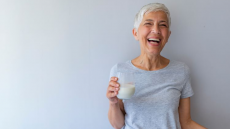Multicultural market for lactose-free
The survey, Lactose Intolerance in Multicultural Communities Survey, revealed that up to 78 percent of African American and 77 percent of Hispanic women reduce the amount of milk or dairy in their diet as a way to manage lactose intolerance.
As a result, 48 percent of African American and 63 percent of Hispanic women worry that they are not getting enough of important nutrients, such as calcium and vitamins A and D, and most are keen to keep some sort of dairy their diet because of its health benefits.
Lactose intolerance - which is the inability to digest lactose, the predominant sugar in milk – is prevalent in several ethnic groups. It is understood that as many as 75 percent of all African-American, Jewish, Native American and Mexican-American adults, and 90 percent of Asian-American adults are lactose intolerant.
The survey was sponsored by the Lactaid brand, which is marketed by McNeil Nutritionals, LLC, a Johnson & Johnson company. A spokesperson for the company was unable to confirm whether Lactaid would be marketed specifically at certain ethnic groups, but stated:“Lactaid decided to conduct the survey to find out more about how multicultural women manage their lactose intolerance because they are more prone to have it.”
Valio, a Finnish company which launched its lactose-free milk into the US earlier this month, said that the American market holds “great potential” for lactose-free milk products.
“Some 60 million Americans suffer from lactose intolerance, especially older Caucasian adults as well as a significant portion of the African-American, Asian-American and Hispanic-American populations who miss the taste of real milk,” said Sam Aquino, sales director of Valio USA.
Valio has launched its lactose free milk into the multicultural Northeastern cities of the US - such as New York, Boston and Philadelphia – where there is a large number of lactose intolerant consumers.
The Lactose Intolerance in Multicultural Communities Survey was conducted by Richard Day Research between July 1-31 2009. The online survey interviewed a national sample of 401 African American and 405 Hispanic women living with lactose intolerance, age 18 and older.
The sample was balanced according to the age and regional dispersion of this population as reported by the U.S. Census Bureau. The sample of Hispanic women was also balanced to reflect the nativity of the Hispanic population.













